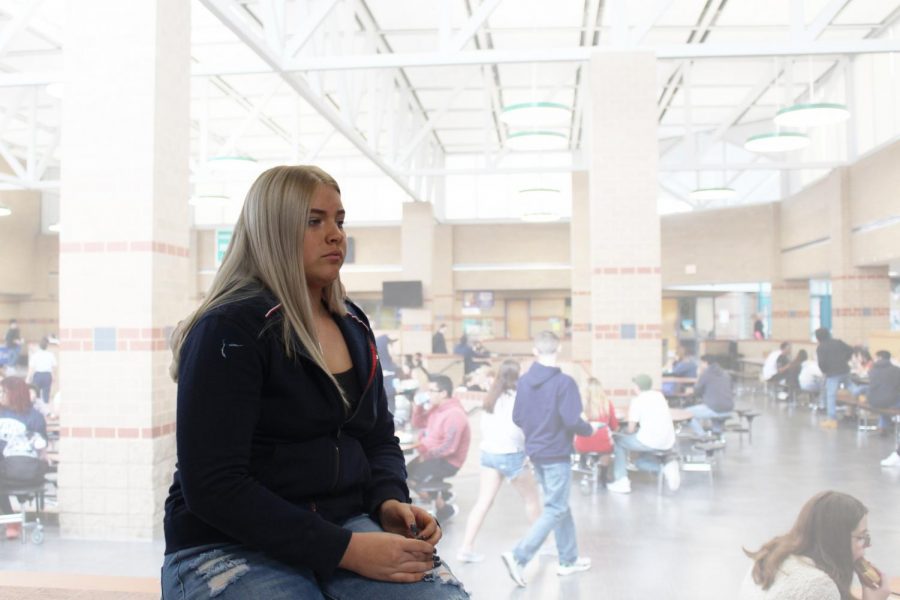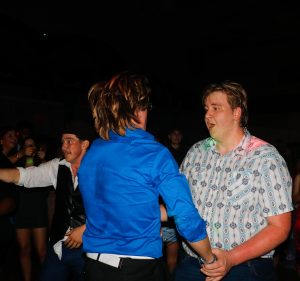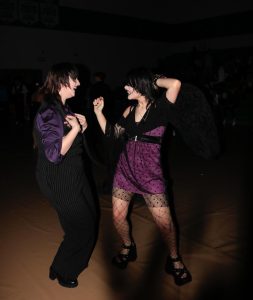“It’s never going to happen to us”
Derby sophomore never thought she would be raped. Now she’s dealing with the aftermath.
May 8, 2020
Another person’s weight pressing down on your body. What is going on?
Pain pierces through your body. Something’s not right.
There is a dull aching pressure where your wrists are pinned back. I’m not supposed to feel like this!
Groggily, you open your eyes. It’s dark in your bedroom, but you’ve just realized what’s happening.
You’re being raped.
Thoughts fill your brain, ranging from fear to questions to defeat: What did I do wrong? Am I going to be in trouble? Who’s going to believe me?
We were just going to hang out.
HE JUST NEEDED A PLACE TO STAY
On Nov. 6, 2019, Derby sophomore Hanna Nichols was raped.
She was raped by a friend who needed a place to stay.
“Before it happened, I used to be with my friends and we’d joke like, ‘it’d never happen to us, it’s never going to happen to us. We’re OK. It’s never going to happen,’ but when it happened, I was like ‘wow, I should’ve never (joked about) that,’” she said.
It happened to Hanna Nichols.
According to rainn.org, approximately 1 of every 6 women and 1 of every 33 men has been the victim of an attempted or completed rape in their lifetime. Including Nichols, 41% have been sexually assaulted by an acquaintance.
“I woke up to it happening, so then I told him no and put my hand in front of him, and he moved my hand so that I had no choice,” Nichols said. “He was bigger than me, and so I was (thinking that) if I don’t let him do this, I’m going to get even more hurt than I am right now.”
Although the physical pain eventually faded, Nichols battled lingering emotional pain. She quit going to school, shutting herself down because not only did she fear others’ disbelief but she dealt with her own self-blame and feelings of powerlessness.
“I was scared of what people would say about me because I blamed myself for the longest time, and I (told myself), ‘you shouldn’t (have) let him in the house, it’s your fault…’” Nichols said. “Now I go to therapy and everything, and that’s helped me realize that it’s not my fault.”
Nichols dismissed the rape whenever it was mentioned, casting a protective shell around herself. Whenever her mom brought up the rape, Nichols left the room, isolating herself.
“I never wanted to talk about it,” she said. “And now I’m kind of like, people need to know what it does to someone.”
THE AFTERMATH
She still remembers the rape every day, but Nichols learned to come to terms with the events of that night.
“When you accept it, you realize that it actually happened, and I used to not want to talk about it because I didn’t want to realize that it happened,” Nichols said.
Upon her return to school, Nichols faced criticism from some people. She was appalled at how many friends she lost, simply because they didn’t believe that it had happened to her.
“They would say they (believed me), that they just didn’t want to ruin their friendship with him and I was thinking, ‘OK, what if he did it to your girlfriend, or your sister?’ ” Nichols said.
“Would you believe them?”
VICTIM BLAMING
Nichols dealt with aspects of rape culture, including victim blaming, trivialization and tolerance, explicit jokes and scrutiny.
“When I was blamed, it made me feel so powerless, it made me feel like I was all alone and it hurt more than anything,” Nichols said.
According to Harvard Law School’s Harassment Assault Law-Student Team (HALT) webpage, to avoid victim blaming, it’s important to comfort the victim, recognizing that the story might be triggering for the survivor. It is also necessary to understand that rape is always the rapist’s fault.
“If you blame the victim, you’re just as bad as the person who did it,” Nichols said.
SPREADING THE WORD
It happened to Nichols.
Now, six months later, Nichols is spreading awareness and positivity to both the people around her, and to other rape survivors.
“Tell someone, because even if you think you’re going to get in trouble – that’s what I thought, I thought my mom was going to hate me – it helps to tell someone,” she said. “… They’ll understand eventually, even if they don’t at the moment.”
She wishes society would be more open-minded and supportive of victims of sexual assault instead of shaming them, leaving the victim or joking about it.
A person is more likely to suffer from depressive or suicidal thoughts after sexual violence, and about 13% of female victims attempt sucide.
“Talk to them, believe them, and don’t leave,” Nichols said. “Try not to close yourself in, try making new friends, try not isolating yourself… it kind of just makes it worse.”
Still, she questions why rape is prevalent, and why justice doesn’t seem to be a concern within the justice system.
One of several controversial cases that people have used to bring attention to the light punishment of sexual assault cases is People v. Turner. The 2015 case, in which Brock Turner was convicted of sexually assaulting Chanel Miller on the Stanford University campus, resulted in a six-month sentence for Turner, followed by three years probation.
“Why would you do that to someone… why would you take advantage of someone like that?” Nichols said. “People like me have to live with it, every day of their life, for the rest of their life, and they just get off with nothing.”
Wichita Sexual Assault Center is a local resource for sexual assault victims of any age.
“All of the services offered by WASAC are free, confidential, and voluntary – we are here to support survivors of sexual violence at any stage of their healing process,” director of Survivor Services Mary Stolz said. “We are also here to support families, friends, and caregivers of survivors because we know this isn’t something that just affects the primary survivor… whether the trauma happened 2 hours ago, or 30 years ago, we are here.”
WASAC has a crisis line at (316) 263-3002 that is available at all times of the day, every day of the year.
“We respond to area hospitals when a victim goes in for forensic evidence collection, and accompany survivors through that process, providing emotional support, resources, and safety planning at all hospitals in Sedgwick, Sumner and Cowley Counties.
There is a therapist for children as well as adults, and court advocates who will go through the criminal justice process with survivors if necessary.
“We have outreach staff who are out in the community providing services to people with high barriers and people who may never walk through the doors to our office… the outreach staff provide services in the jail, drug and alcohol recovery centers, homeless shelters and day programs, nursing homes, college campuses, etc.,” Stolz said.
Nichols had one final thought to share.
“It happened to me, it’s happening all over the world,” she said. “Tell someone. If you isolate yourself, it just makes it worse.”








Jack • May 7, 2020 at 1:21 am
Thank you for coming forward with your story. I’m also a survivor and am in therapy for it, and the mentality of blaming yourself is so real. You are an inspiration and it was never your fault.